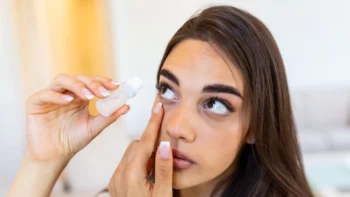While you may not notice it throughout the day, the amount of times you blink is actually staggering. On average, you’ll spend 1/10th of your day with your eyes closed, blinking anywhere between 14,400-19,200 times. This involuntary reflex serves as a way to protect and maintain your eye health, by clearing away debris, moisturizing your eye’s surface, and providing it with nutrients and oxygen. So, what happens if you don’t blink for a long time? Let’s dive in and take a look at the potential implications of not blinking enough.
What Happens If You Stop Blinking: Consequences & Risks
Everyone is different, but not blinking enough, or not blinking at all, can impact the health of your eyes in the following ways:
- Dry Eyes: If you’re in the “I don’t blink enough” camp because you work with screens all day or find blinking to be distracting, this can lead to dry eyes as the cornea won’t get the moisture and nutrients it needs. Prolonged periods of no blinking can lead to chronic dry eye syndrome, which has symptoms like discomfort, gritty sensations, and burning/stinging eyes.
- Increased Risk Of Eye Infections: In addition to wiping debris from your eyes, blinking also supplies oxygen to them. Not blinking enough deprives your eyes of both of these benefits, disrupting the even distribution of the tear film and increasing the growth of bacteria on the eye’s surface. If the eye becomes infected, it may show up as “pink eye”, styes, or as more serious ailments like corneal ulcers.
- Corneal Swelling: One of the answers to, “what happens if you don’t blink” is corneal swelling. Because the cornea (the transparent front part of the eye) doesn’t have blood vessels, it relies on the tear film to replenish it with oxygen. If you stop blinking, your cornea may swell, leading to blurry vision, light sensitivity, and discomfort.
You can tell that you’re not blinking enough when you have blurred vision, increased sensitivity to light, or eye fatigue and strain. For instance, continuous screen time or intense concentration can cause you to slow down your blinking rate, leading to achy eyes that are tired and dry.
Why Am I Not Blinking? The Impact of Modern Life On Blinking
Modern life significantly impacts your blinking habits and contributes to a decreased blink rate. Here are a few reasons why you may find yourself not blinking enough:
1. Screen Time: The increased use of digital devices such as computers, smartphones, and tablets, has many people spending long periods staring at screens. This leads to significant stretches of little, or no blinking.
2. Concentration and Focus: Similar to electronics, tasks that require intense focus, such as reading, writing, or intricate work, can lead to reduced awareness of blinking. If you’re wondering “Why am I not blinking”, during these types of tasks, it could be because you’re unconsciously reducing your blink rate, resulting in inadequate lubrication for the eyes.
3. Environmental Factors: Environmental conditions can also affect blinking habits. Dry or dusty air can make the eyes more prone to discomfort, causing individuals to not blink enough to avoid aggravating them.
4. Stress and Fatigue: Stress and fatigue can also be why you’re not blinking enough. Both of these can cause increased muscle tension, making it more difficult to maintain a regular blinking pattern. So, you may involuntarily hold your eyes open for longer periods without realizing it.
5. Poor Blinking Habits: It’s possible to develop poor blinking habits over time, such as staring or holding your gaze for long periods without consciously blinking. These habits can disrupt the natural blinking reflex and lead to dry, uncomfortable eyes.
Understanding the impact of modern life on your blinking habits is crucial for maintaining healthy eyes. To counteract the effects of not blinking enough, it is essential to be mindful of your blink rate and consciously make an effort to blink regularly, especially during prolonged screen use. Taking periodic breaks, practicing the 20-20-20 rule (looking away from the screen every 20 minutes for 20 seconds at something 20 feet away), and using artificial tears or lubricating eye drops can help alleviate dryness and promote healthy blinking habits.
If you’re facing any issues related to blinking or other eye health concerns, feel free to contact us at Brimhall Eye.





